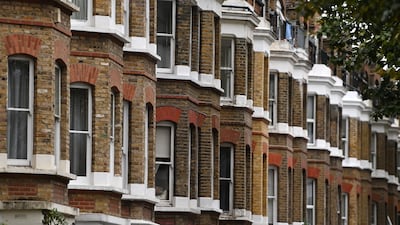The average tracker mortgage repayment in the UK is set to rise by nearly £900 ($1,035) a year on Thursday as the Bank of England prepares to unveil the biggest rise in interest rates in more than three decades.
Economists predict the key Monetary Policy Committee (MPC) will raise the base rate by 0.75 percentage points to 3 per cent at its meeting on November 3.
That would be the eighth consecutive jump in interest rates by the central bank, and the biggest increase since 1989.
The change will have an immediate effect on 1.5 million mortgage holders who are not on fixed-rate deals.
There are 715,000 households on tracker mortgages and a further 895,000 on variable mortgages.
At 3 per cent, the average standard variable rate mortgage repayment will increase by £46.22 a month, or £554.64 annually.
But the average household on a tracker mortgage will see their monthly repayment rise by £73.49 per month, or £881 annually.
Analysts say there is about a 90 per cent chance of a 75-basis-point rise in the bank rate to 3 per cent on November 3.
Base interest rates are predicted to peak at about 4.75 per cent next year, which is down from more than 6 per cent before the sudden end of “Trussonomics”.
Thursday’s rise will aim to tame soaring inflation, which is running above 10 per cent.
Figures released on Wednesday show food inflation soared to 11.6 per cent in October as even basics such as tea bags and sugar saw significant price rises.
Overall shop prices are now 6.6 per cent higher than they were this time last year — also a record — but food price inflation jumped well above September's 10.6 per cent rate and the three-month average rate of 9.7 per cent, according to the British Retail Consortium-Nielsen Shop Price Index.
Fresh food prices are now 13.3 per cent higher than they were last October, up from 12.1 per cent in September.
Non-food inflation accelerated to 4.1 per cent, from 3.3 per cent in September.
Richard Walker, the managing director of supermarket chain Iceland, has said UK businesses have a responsibility to shoulder lower profits this winter to help families through a cost-of-living crisis.
He said the cost of milk has rocketed by 50 per cent, while the price of other staples such as bread and eggs has also increased.
“It will get worse as well. I have cost prices currently on the table from big branded suppliers that we haven’t stomached yet as a business, let alone have to pass on to our customers,” the managing director told Radio 4’s Today programme on Wednesday.
He said businesses should be prepared to forgo profits to help people cope.
“I think businesses accepting lower or no profits in our case is very important. We have 800,000 kids living in poverty who don’t qualify for free school meals.”


